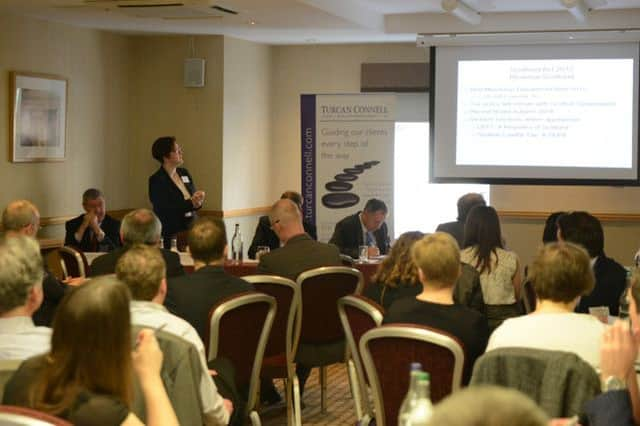Tax to change no matter the result of referendum


Alexander Garden, tax and succession partner at Turcan Connell, told a breakfast seminar on taxation: “We know significant changes will be coming post-September 18, in the event of a Yes or a No vote. I think it is likely we will see some kind of divergence in terms of personal taxation – although I cannot say how that will look yet. Where you live in the UK will end up defining whether you pay more or less tax.”
Mr Garden told delegates at the seminar, organised by The Scotsman Conferences and Turcan Connell, that Alex Salmond had suggested he wanted to reduce the tax burden on businesses in the event of a Yes vote. However, Mr Garden argued, the independence white paper was pretty silent on the issue of personal taxation. In the six pages – of almost 650 – on tax in the white paper, he said there was “nothing about the detail of individual taxation or personal capital taxation like capital gains tax or inheritance tax”.
Advertisement
Hide AdAdvertisement
Hide AdHe added: “We will inherit the UK tax system and its rates in the event of independence. There is no great detail yet on what the other parties want. That creates uncertainty and there is a lot of it about now and it’s likely to remain for some time. We know changes are coming but have no hard and fast detail what they are likely to be.
“If significantly different approaches are taken, I think this could well lead to cross-border movements for tax reasons. There is a tipping-point when people say ‘These changes are being made and I can go elsewhere into a different regime; what’s stopping me?’”
Mr Garden stressed it was not possible to make such decisions based on existing information as there was still so much uncertainty about what might happen to a whole range of personal and corporate taxes.
Patrick Stevens, tax policy director at the Chartered Institute of Taxation, suggested Scotland had the most complex tax system in the world and that although everyone wanted simplification – highlighted by the head of Revenue Scotland, Eleanor Emberson, as “the big issue” in the white paper – this invariably meant there would be winners and losers.
Mr Stevens painted a detailed and complex backdrop against which Scotland would take decisions about its future, whether that was independence or further devolution.
He said many countries were positioning their business tax policies to attract multi-nationals, with low corporate taxes paid by huge companies seen as a minor price to pay alongside the benefits the arrival of multi-nationals could bring, including employment, personal taxation, VAT and National Insurance.
In that context, he asked: “Why not abolish corporation tax altogether –though it might not be politically expedient.”
The approach to low business taxes was the direction of travel just about everywhere apart from the United States – and the UK was one of the most sophisticated at arranging its system to suit big incomers, Mr Stevens said.
Advertisement
Hide AdAdvertisement
Hide AdHe warned that this could cause problems with indigenous businesses who would be unhappy if they didn’t share the same benefits. Following on from this, he said: “If you make it more attractive for businesses and the people running them, you have another problem – people who own businesses are better off than employees.”
Mr Stevens said the UK’s headline corporation tax rate of 20 per cent looked high compared to 12.5 per cent in Ireland and 10-15 per cent in eastern Europe, but said the UK Patent Box Regime to encourage R&D could bring this down to 10 per cent, before multiple deductions. “This starts to look very attractive – but Italy and Germany have noticed and are complaining via Europe about unfair competition.”
In summary, Mr Stevens said any new business tax regime would need to attract businesses to Scotland and support the self-employed.
Ms Emberson stressed that the specific taxes mentioned in the white paper were aspirations rather than commitments, to be introduced as and when budgetary constraints allowed. This included the aspiration to set corporation tax 3 per cent lower than the rest of the UK and to reduce air passenger duty by 50 per cent.